Essays
Critical Essay - A Writer's Purpose
August/09/2025 05:12 PM Filed: Critical Essays

© Julia Charpentier
What motivates a writer to write? An interesting test reveals an author's purpose more than a carefully phrased answer. After completing a work, create a sample file. Then evaluate common catalysts and temporarily delete this material:
1) Paragraphs or scenes containing violence.
2) Paragraphs or scenes containing sex.
3) References to religious doctrine.
4) References to political ideology.
One stimulus may have saturated a work. Yet the most inspired and talented nonfiction authors build upon a unique foundation, such as experience, passion, and enlightenment. Fiction writers establish intrigue and suspense without gratuitous descriptions flooding the manuscript. Commercial endeavors rely on action and controversy for marketing, resulting in greater reliance on immersion techniques.
A percentage of all test files will be deleted. It is those still intact that have the greatest potential to leave a lasting impression in literature.
Critical Essay - Inner Editor
July/16/2025 04:44 PM Filed: Critical Essays

© Julia Charpentier
Like a scene from an archaic novel, meet the inner editor:
It had been years since she had seen the sun. No one had locked her up, no barrier had been placed on her door. Though sunlight streamed through her windows, she no longer felt its warmth or appreciated the intriguing patterns its beams projected on her floor. She lived in self-imposed darkness, grieving for a time that had passed and could not be lived again.
Immersed in the words of a detractor, contemplative and uncertain, she is critical of her world. A long ago place, her place, her only home, now a dimly lit memory faded against these confining walls. Not a home with doors and windows, but a free outdoor space, it was a refuge that thrived under an endless light.
Bask in the sunlight and flourish. Then read my October-November 1992 clip on self-editing published in The Write Touch, a newsletter for authors.
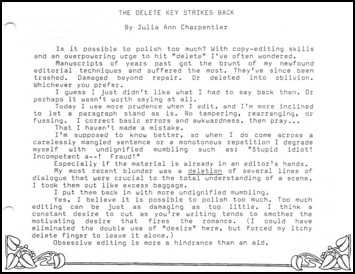
Critical Essay - Feminism
May/24/2022 01:25 PM Filed: Critical Essays
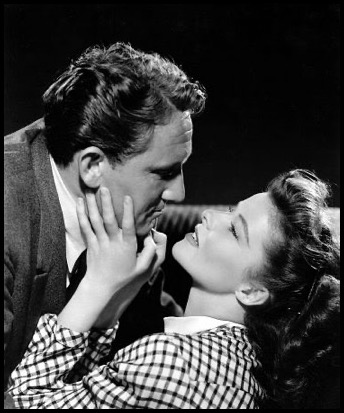
Woman of the Year (1942)
Katharine Hepburn and Spencer Tracy
Metro-Goldwyn-Mayer (work for hire)
(Wikimedia Commons)
Feminism hangs out with the young, openminded woman. Traditionalism socializes with the mature, conservative matron. Familiar associations fail to define what either emotion-packed term means when enacted, blindly leading to assumptions about lifestyle.
Twenty-first-century ideals embrace feminism, yet the meaning of tradition in a woman's life does not equate with loss of freedom. Staid, old, and structured, governed by organized religion, conventional confinement remains synonymous with traditionalism, an unfortunate comparison. A feminist, in reality, could be bound tighter by a self-inflicted doctrine that inhibits creativity and happiness, cutting her away from time off, time enjoyed, and time employed at home.
A traditional woman could be married or unmarried, homosexual or heterosexual, religious or an atheist. Over time, distortions marred the value of tradition, rendering the concept counterproductive and entwining the ideology with our past. A feminist serves as a pillar of her community, setting an example, working endlessly, while a traditionalist leads a life dictated by the patriarchy, another common fallacy.
Laden with political baggage and growing heavier as decades pass, these overburdened and overused words bog down any woman seeking options, opposed to abiding by a set of rules. Feminism adheres to an arrangement comparable to traditionalism, admired by those who wish to reestablish a daily norm, making the routine aspects of living compatible with contemporary society. Not always beneficial, often flouted, this intellectual change initiated insincere commitment to a grindstone deemed superior.
Until traditionalism crawls out of the maligned alternative-lifestyle attic, discontentment will besiege the woman eager to reach her potential without jumping off a personal ledge holding onto an unwanted moniker attributed to a group rather than an individual.
Critical Essay - Censorship
May/11/2022 09:39 AM Filed: Critical Essays

Artist: Piotr VaGla Waglowski
(Wikimedia Commons)
If offensive words are removed from language, would the definition of "offensive" change? A desire to extract a derogatory moniker or blunt description will result in certain individuals classifying the action as noble, a necessary purging of negative thoughts that should not be in a person's mind. Censorship has an ultimate goal—control.
A power struggle lurks beneath the surface of every deletion and every rewrite if the intention skulks behind political warfare. Like a cyberattacker, a censor disables a natural flow of communication. Obstruction is not only unethical and inhuman, it is impossible. Getting rid of ugly nouns, sarcastic innuendos, and scathing adjectives will accomplish nothing. Manipulation of language does not eliminate social problems; this treacherous process triggers unrest.
Disinformation and misinformation, terms coined by hired evaluators, refer to disputable content. Viewpoints differ, a manifestation of cultural, religious, and philosophical beliefs, including scientific shifts that alter the foundation for an accurate statement. Science evolves, changing as new information emerges. Squelching discourse, attempting to make knowledge rigid, halts discovery.
Libraries worldwide store books, magazines, newspapers, videos, and audio recordings that contain material someone wants to censor. As targets are established and editing begins, where does this expurgation propose to end?
After infinite directives and endless redlining, freedom of expression will be hyperregulated, while angry people pick through a word dump, like scavenging through a landfill hunting for deleted information. Archaic mistakes haunt these censors.
Critical Essay - Romantic Pulp
January/14/2022 02:49 PM Filed: Critical Essays
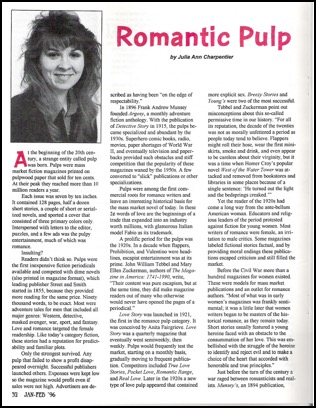
At the beginning of the twentieth century, a strange entity called pulp was born. Read about the historical roots of romance fiction in my January-February 1996 article published in the Romance Writers Report.
Critical Essay - Our Students Need Individual Attention
January/28/2021 11:02 AM Filed: Critical Essays
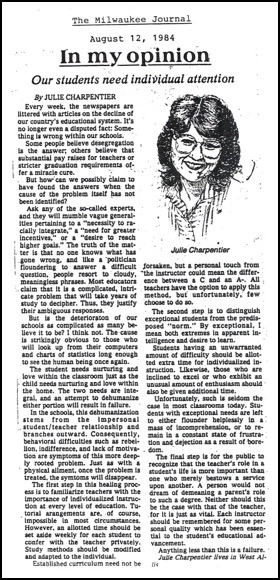
Read this published clip featured in the Sunday edition of The Milwaukee Journal (Milwaukee Journal Sentinel) on August 12, 1984. Addressing the need for personalized education, my guest editorial explores the reasons for deterioration in our educational system, a topic again in the news. This was my first article credit at age twenty-one.
Apple Books - Upcoming Releases
November/28/2023 11:40 AM Filed: Apple Books
The Indigo Dream Catcher, my second collection of paranormal short stories with an extrasensory twist, is my latest fiction release, following Summer Solstice, an exploration of the human psyche in thirty interludes, each depicting a woman at a turning point. My three novellas take the reader into the starlit, musical backdrop of a sultry Memphis night, behind the scenes onto the offbeat field of professional soccer, and on a supernatural escapade through the streets of Paris, listening to the haunting melody of an unpublished poem by Irish playwright Oscar Wilde. “Love Song” was composed in 1876 and left unfinished, an inspiration for the mystical plot. An academic history of the romance genre, a bio-bibliography on silent film actor Rudolph Valentino, and a collection of essays on American writer Jack London complete my author list.
Apple Books - Jack London
November/28/2023 11:40 AM Filed: Apple Books
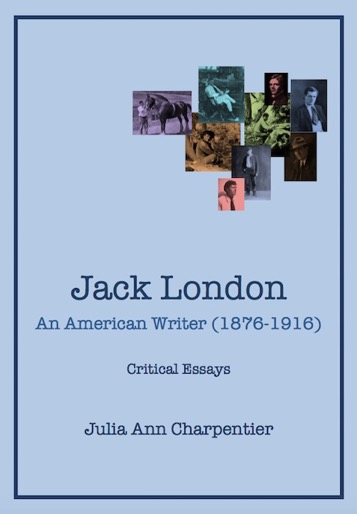
A collection of seven critical essays, JACK LONDON: AN AMERICAN WRITER (1876-1916) reveals a complicated figure with a literary persona and a mass-market image. London rose from a working class background in Oakland, California, to prominence as one of the most famous and prolific authors in the world. Scholars have put him under a literary microscope since his death in 1916. Academics analyze his work, his political views, and his love life in an attempt to distinguish between the private man and the public figure, while modern writers find his creative output daunting. Available December 26, 2023, on Apple Books.
- Quest for Eden
- Psychology and Symbolism
- Structural Significance
- Character and Technique
- Political Rebellion
- Idealism and Worldview
- Private Man and Public Figure